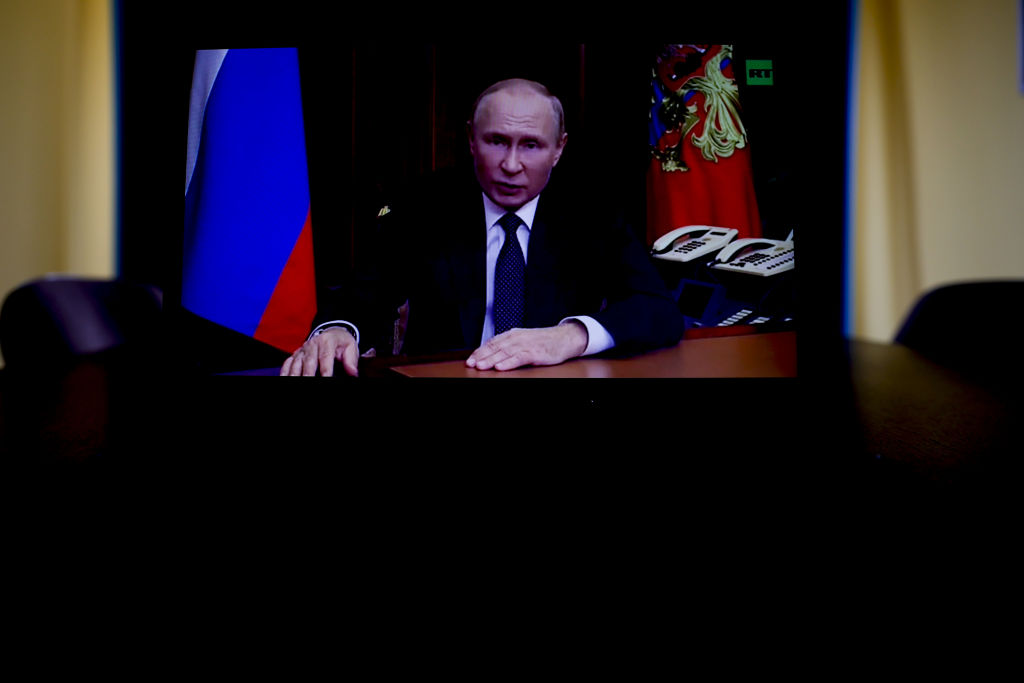Putin announces 'partial mobilization' of 300,000 Russian reservists to fight in Ukraine


A free daily email with the biggest news stories of the day – and the best features from TheWeek.com
You are now subscribed
Your newsletter sign-up was successful
Russian media on Wednesday broadcast a pre-recorded speech from Russian President Vladimir Putin announcing a "partial mobilization" of military reservists for his war in Ukraine, effective immediately. "Only citizens who are currently in the reserve will be subject to conscription, and above all, those who served in the armed forces have a certain military specialty and relevant experience," he said. Defense Minister Sergei Shoigu, speaking after Putin, said about 300,000 reservists will be called up.
Shoigu tried to "dampen down the fears of Russian men across the country about this sudden 'partial mobilization' to Ukraine," BBC Eastern Europe correspondent Sarah Rainsford writes. But despite his assurances, "the war that many Russians have been trying, largely, to ignore, has now been brought much closer to home for tens of thousands of them."
"Putin's gambit has a strong element of risk — it could backfire, by making the Ukraine war unpopular at home and hurting his own standing, and it exposes Russia's underlying military shortcomings" while providing no boost on the battlefield for months, The Associated Press notes. Russia's stock market took a dive after Putin's announcement. Russians started searching for ways to get out of the country as soon as rumors of the speech spread Tuesday.
The Week
Escape your echo chamber. Get the facts behind the news, plus analysis from multiple perspectives.

Sign up for The Week's Free Newsletters
From our morning news briefing to a weekly Good News Newsletter, get the best of The Week delivered directly to your inbox.
From our morning news briefing to a weekly Good News Newsletter, get the best of The Week delivered directly to your inbox.
Putin's mobilization bombshell capped a speech in which he blamed the West for his invasion, welcomed the upcoming "referendums" in four Russian-controlled regions of Ukraine, and threatened NATO countries with nuclear retaliation. "When the territorial integrity of our country is threatened, to protect Russia and our people, we will certainly use all the means at our disposal — this is not a bluff," he said. "Those who try to blackmail us with nuclear weapons should know that the prevailing winds can turn in their direction."
"The threat is clear," The Economist's Oliver Carroll tweeted. "'We will annex Ukrainian territories with bombs and referenda. If you try to take them back, we reserve the right to nuke you.' Fundamentally, doesn't change much on the battlefield. The aim, I'd suggest, is to test Western support of Ukraine."
"Putin's breaking of his own promise not to mobilize parts of his population" is an "admission that his invasion is failing," British Defense Secretary Ben Wallace responded. "No amount of threats and propaganda can hide the fact that Ukraine is winning this war" and "Russia is becoming a global pariah."
A free daily email with the biggest news stories of the day – and the best features from TheWeek.com
Peter has worked as a news and culture writer and editor at The Week since the site's launch in 2008. He covers politics, world affairs, religion and cultural currents. His journalism career began as a copy editor at a financial newswire and has included editorial positions at The New York Times Magazine, Facts on File, and Oregon State University.
-
 The ‘ravenous’ demand for Cornish minerals
The ‘ravenous’ demand for Cornish mineralsUnder the Radar Growing need for critical minerals to power tech has intensified ‘appetite’ for lithium, which could be a ‘huge boon’ for local economy
-
 Why are election experts taking Trump’s midterm threats seriously?
Why are election experts taking Trump’s midterm threats seriously?IN THE SPOTLIGHT As the president muses about polling place deployments and a centralized electoral system aimed at one-party control, lawmakers are taking this administration at its word
-
 ‘Restaurateurs have become millionaires’
‘Restaurateurs have become millionaires’Instant Opinion Opinion, comment and editorials of the day
-
 New START: the final US-Russia nuclear treaty about to expire
New START: the final US-Russia nuclear treaty about to expireThe Explainer The last agreement between Washington and Moscow expires within weeks
-
 What would a UK deployment to Ukraine look like?
What would a UK deployment to Ukraine look like?Today's Big Question Security agreement commits British and French forces in event of ceasefire
-
 Trump peace deal: an offer Zelenskyy can’t refuse?
Trump peace deal: an offer Zelenskyy can’t refuse?Today’s Big Question ‘Unpalatable’ US plan may strengthen embattled Ukrainian president at home
-
 Vladimir Putin’s ‘nuclear tsunami’ missile
Vladimir Putin’s ‘nuclear tsunami’ missileThe Explainer Russian president has boasted that there is no way to intercept the new weapon
-
 How should Nato respond to Putin’s incursions?
How should Nato respond to Putin’s incursions?Today’s big question Russia has breached Nato airspace regularly this month, and nations are primed to respond
-
 Russia’s war games and the threat to Nato
Russia’s war games and the threat to NatoIn depth Incursion into Poland and Zapad 2025 exercises seen as a test for Europe
-
 What will bring Vladimir Putin to the negotiating table?
What will bring Vladimir Putin to the negotiating table?Today’s Big Question With diplomatic efforts stalling, the US and EU turn again to sanctions as Russian drone strikes on Poland risk dramatically escalating conflict
-
 The mission to demine Ukraine
The mission to demine UkraineThe Explainer An estimated quarter of the nation – an area the size of England – is contaminated with landmines and unexploded shells from the war
